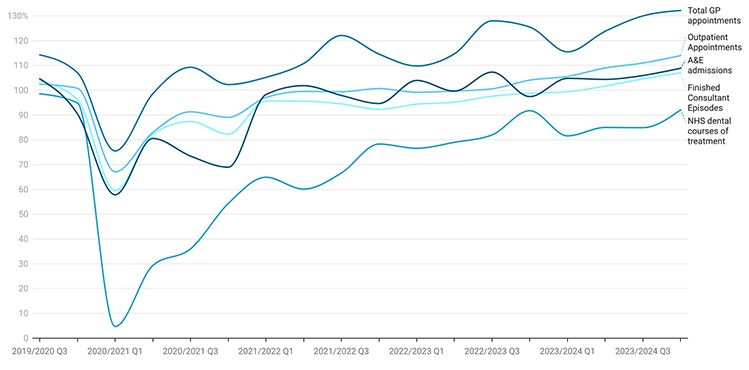This service certainly has a story to tell. How a core part of healthcare ended up facing the worst crisis in its history. How the pandemic accelerated trends long in motion and brought services to the brink. How, ultimately decisions made ensured millions of patients in 2024 are still struggling to access care.
Yet the COVID Inquiry now risks repeating a key error from the pandemic, and the planning that proceeded it.
So, we’ve gathered the evidence, and it is very clear dentistry needs to be on the menu.
An optional extra?
At lockdown dentistry was treated like an optional extra rather than a core part of our health service. Private dentistry, which provides care to millions and on which the mixed economy of most NHS practices depends, was treated like it didn’t exist.
Pandemic preparations did not really consider the role of dentists or dentistry and this lack of consideration extended into the pandemic itself. Time after time dentists and dentistry were overlooked and neglected.
Clear and consistent communications were too often the missing piece, as practices struggled to navigate ever-changing regulations and recommendations. The abrupt closure of dental practices during the early stages of the pandemic left millions without access to essential dental care, exacerbating existing oral health inequalities.
While stricter infection prevention control measures were necessary to limit transmission of the virus, the Government's failure to implement effective contingency plans for maintaining dental services has resulted in a backlog of unmet dental need that will take many years to clear.
The lack of financial support provided to private practices underscores this failure to consider and understand dentistry. Many practices faced closure or significantly reduced capacity, but were cut out of most support packages, with decision-makers failing to understand that a significant proportion of dental care is delivered outside the NHS.
The hard numbers
Dentistry saw the sharpest fall in capacity anywhere in our NHS, and the weakest recovery.
Activity in NHS primary and secondary care as % of pre-COVID norms (England)


Make no mistake, dentistry didn’t have to become the outlier. But we lost a third of all capacity from lockdown through to spring of this year. That compares to 2% for outpatient care, and 6% for A&E admissions. General Practice has more than made up on patient contacts since lockdown.
Political choices – on suspension and restoration of services, and the recovery – left dentistry lagging behind. This gulf has been sustained and eclipses even those parts of secondary care that have been subject to widespread industrial action.
It’s why over 52 million NHS dental appointments have been lost since lockdown in England, the equivalent of well over a year’s worth of dentistry in normal times. It’s why unmet need for NHS dentistry in England now stands at 13 million – or 1 in 4 of the adult population. It’s why 97% of new patients who try to access NHS care are unsuccessful.
Clearly, the problems in NHS dentistry predate lockdown, but the choices made during the pandemic turbocharged them. Long discredited contracts were impossible to deliver, and the previous Government failed to make any significant breaks from them.
The new administration has pledged fundamental reform, but we need to see real urgency and ambition. We cannot go on as we are.
Memories of Covid
Never before has this profession faced such profound challenges.
And I want to extend my thanks to every dentist and every member of the dental team for the role they played.
Setting up Urgent Dental Care Centres in a matter of days. Being redeployed from hospital dental departments to ICUs. Helping to administer vaccines or ensuring that patients continued to have access to routine dentistry.
All of you navigated such huge uncertainty, from March 2020, right through to the present day. It is why the UK COVID Inquiry needs to consider this evidence.
Dental care is healthcare, and failure to take a whole-system approach to future pandemic planning - and to this Inquiry – will carry real consequences for millions of patients, and for tens of thousands of our colleagues.

